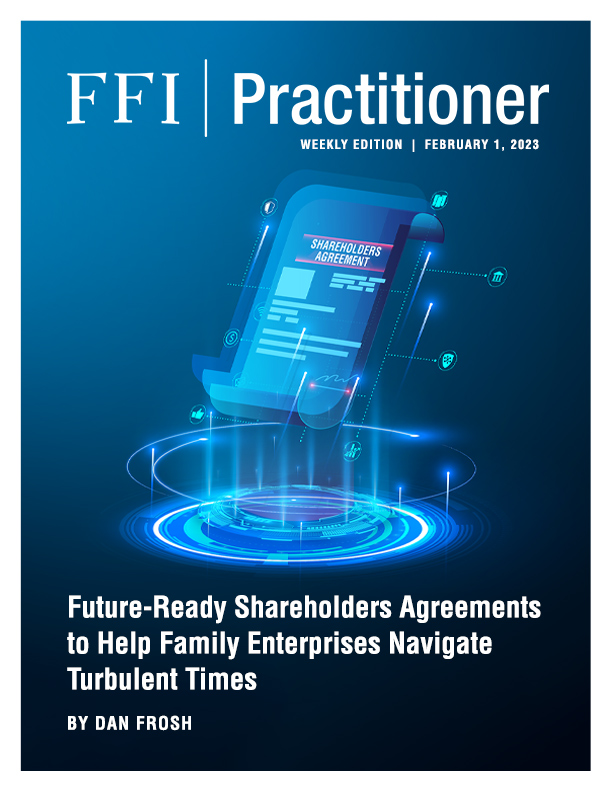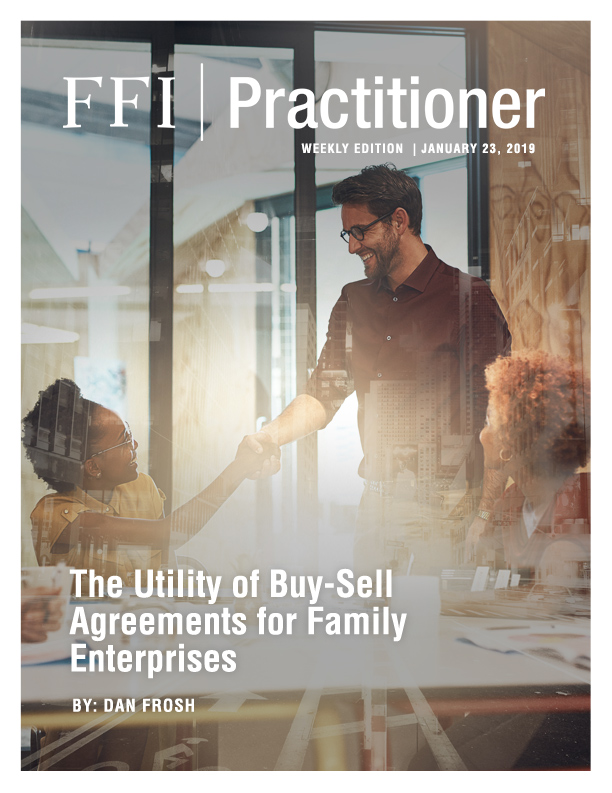
A well-designed shareholders agreement can help your clients create a future-ready family enterprise with an ownership governance system that provides the necessary flexibility to guide the family into an uncertain future.
The shareholders agreement is a legally binding arrangement among a company’s owners that describes a) the key ownership rights and responsibilities, and b) high-level parameters about how the company should be operated. These agreements are beneficial for all closely held family businesses, and if your clients do not currently have a shareholders agreement in place, they should seriously consider drafting one. If your clients already have a shareholders agreement in place but have not reviewed it in many years, this would be an opportune time to evaluate its contents as they plan for the future.
Establish clear and efficient ownership decision-making processes, including appropriate approval thresholds and deadlock provisions. To be effective in an increasingly fast-paced and unpredictable world, family enterprise owners need to be agile enough to seize opportunities and address risks as they appear. This agility requires an effective and efficient ownership group that is well-informed and unified behind a common vision for the future of their enterprise. An effective shareholders agreement can support the ownership group in these goals and allow for dynamic decision-making.
Shareholders agreements should include provisions that outline the appropriate approval thresholds for various ownership-level decisions (e.g., restructuring the company’s ownership or approving major transactions and significant borrowing). Some ownership decisions are so significant to the future of the business that a high approval threshold (at least a super majority) may be appropriate to ensure that a large majority of the owners are aligned and agree with the decision. However, advisors should recommend to their clients that they carefully examine the potential impacts of setting this approval threshold too high. Requiring a high or unanimous approval threshold could empower a small group of owners, or even one dissenting owner, to slow down the process so much as to miss time-sensitive opportunities or to fail to react in time to looming threats.
It is equally important to make sure your clients incorporate deadlock provisions into their shareholders agreements. Among many creative deadlock provision options, owners can consider the following:
Several key components can help to ensure that your clients’ shareholders agreements provide owners with sufficient flexibility and agility to successfully navigate a turbulent future:
Establish clear and efficient ownership decision-making processes, including appropriate approval thresholds and deadlock provisions. To be effective in an increasingly fast-paced and unpredictable world, family enterprise owners need to be agile enough to seize opportunities and address risks as they appear. This agility requires an effective and efficient ownership group that is well-informed and unified behind a common vision for the future of their enterprise. An effective shareholders agreement can support the ownership group in these goals and allow for dynamic decision-making.
Shareholders agreements should include provisions that outline the appropriate approval thresholds for various ownership-level decisions (e.g., restructuring the company’s ownership or approving major transactions and significant borrowing). Some ownership decisions are so significant to the future of the business that a high approval threshold (at least a super majority) may be appropriate to ensure that a large majority of the owners are aligned and agree with the decision. However, advisors should recommend to their clients that they carefully examine the potential impacts of setting this approval threshold too high. Requiring a high or unanimous approval threshold could empower a small group of owners, or even one dissenting owner, to slow down the process so much as to miss time-sensitive opportunities or to fail to react in time to looming threats.
It is equally important to make sure your clients incorporate deadlock provisions into their shareholders agreements. Among many creative deadlock provision options, owners can consider the following:
- Appointing a tiebreaking vote, which could be a trusted third party, a shareholders, or even the board of directors. However, be careful about how your client implements this option, as it could effectively mean delegating an ownership decision to a non-owner.
- Mediation or arbitration to resolve the disagreement with the use of an objective third party.
- Elect to leave the status quo if the requisite approval threshold cannot be achieved.
- A liquidation deadlock clause, which would force the owners to sell or liquidate the business together. This is generally considered the last resort but may help encourage the owners to collaboratively seek a more beneficial solution.
Develop a flexible dividend policy. Even during the most stable and predictable times, family enterprise owners must grapple with the difficult topic of defining a fair dividend policy—one that balances the strategic needs of the business with the demands of the family. On the business side, profits can be reinvested internally to help fund important strategic initiatives, new opportunities, targeted acquisitions, or to build a reserve to help the company prepare to weather future economic downturns. On the family side, dividends can help to fund individual family members’ living expenses and lifestyle, collective family initiatives including educating members of the next generation, family and owner governance activities, or the family’s social impact activities.2
In turbulent times, balancing these competing interests can become even more challenging. During periods of economic uncertainty or crisis, the survival of the family enterprise may require reducing or suspending dividend distributions to fund essential corporate operations until the economic landscape turns around. Consider recommending to your clients that their shareholders agreements contain a dividend policy that provides some discretion to the board of directors, in consultation with the owners, to determine an annual dividend that effectively balances the financial needs of the company with the needs of the owners.
Develop a flexible dividend policy. Even during the most stable and predictable times, family enterprise owners must grapple with the difficult topic of defining a fair dividend policy—one that balances the strategic needs of the business with the demands of the family. On the business side, profits can be reinvested internally to help fund important strategic initiatives, new opportunities, targeted acquisitions, or to build a reserve to help the company prepare to weather future economic downturns. On the family side, dividends can help to fund individual family members’ living expenses and lifestyle, collective family initiatives including educating members of the next generation, family and owner governance activities, or the family’s social impact activities.2
In turbulent times, balancing these competing interests can become even more challenging. During periods of economic uncertainty or crisis, the survival of the family enterprise may require reducing or suspending dividend distributions to fund essential corporate operations until the economic landscape turns around. Consider recommending to your clients that their shareholders agreements contain a dividend policy that provides some discretion to the board of directors, in consultation with the owners, to determine an annual dividend that effectively balances the financial needs of the company with the needs of the owners.
Sidebar
by Dan Frosh
This week’s contributor, Dan Frosh provides an examination of the many benefits and features of effective buy-sell agreements within the family enterprise context.
Create reasonable options to provide for greater owner liquidity. Periods of economic, political, or societal uncertainty can trigger some family enterprise owners to examine their personal portfolio more critically. These family owners may become increasingly uncomfortable with having such a significant portion of their personal wealth tied up in their largely illiquid ownership interest in the family business(es), and they may wish to explore more flexible options to achieve increased liquidity.
In such cases, shareholders agreements that provide for reasonable, ongoing redemption options could help to alleviate these concerns and provide some level of increased liquidity (and thus flexibility) for family owners. However, in designing the parameters of an ongoing redemption program, it is also important to consider the strategic objectives and financial well-being of the company.
Establish rules and mechanisms to address internal turbulence. As family enterprise advisors are aware, external turbulence is not the only threat to the multigenerational success of their clients. Internal disorder and instability within the family enterprise (which can be sparked or amplified by external turbulence) can represent at least as great a threat to the enterprise’s long-term success as any external concern.
Effective shareholders agreements should include provisions that can help to manage internal turbulence caused by disruptive or misbehaving owners, including the following:
Create reasonable options to provide for greater owner liquidity. Periods of economic, political, or societal uncertainty can trigger some family enterprise owners to examine their personal portfolio more critically. These family owners may become increasingly uncomfortable with having such a significant portion of their personal wealth tied up in their largely illiquid ownership interest in the family business(es), and they may wish to explore more flexible options to achieve increased liquidity.
In such cases, shareholders agreements that provide for reasonable, ongoing redemption options could help to alleviate these concerns and provide some level of increased liquidity (and thus flexibility) for family owners. However, in designing the parameters of an ongoing redemption program, it is also important to consider the strategic objectives and financial well-being of the company.
Establish rules and mechanisms to address internal turbulence. As family enterprise advisors are aware, external turbulence is not the only threat to the multigenerational success of their clients. Internal disorder and instability within the family enterprise (which can be sparked or amplified by external turbulence) can represent at least as great a threat to the enterprise’s long-term success as any external concern.
Effective shareholders agreements should include provisions that can help to manage internal turbulence caused by disruptive or misbehaving owners, including the following:
- Buy-Sell Provisions: These components of a shareholders agreement define owners’ rights and obligations upon the occurrence of certain triggering events and can help your clients to navigate tumultuous events (i.e., the sudden death, divorce, or incapacitation of an owner or how to force the sale of shares by a detrimental owner who has engaged in serious misconduct). For more information on the benefits of well-drafted buy-sell provisions, please see this previous FFI Practitioner article.
- Confidentiality Clause: Unless an owner is also a member of the board of directors, there is typically no inherent duty to keep business information confidential. Given the rights of owners to receive information about their business (including the right to inspect corporate books and records), advising your clients to include a provision that requires owners to maintain confidentiality can be wise and can help to avoid the risk of a disruptive owner attempting to share sensitive information publicly.
The author acknowledges Andrew Hier for his contributions on the topics addressed in this article.
References
1 Davis, John A. “Transforming a Family Business in Turbulent Times” Harvard Business Review. September 30, 2022. https://hbr.org/2022/09/transforming-a-family-business-in-turbulent-times
2 Hier, Andrew. “Tough Decisions: Family Business Dividends in Turbulent Times.” https://cfeg.com/insights_research/tough-decisions-family-business-dividends-in-turbulent-times/




